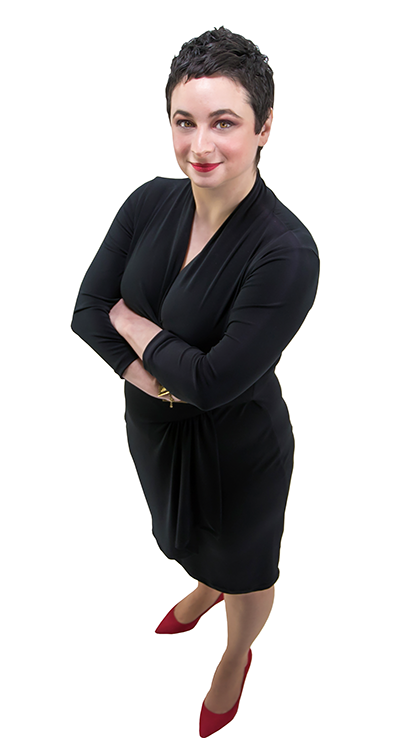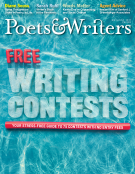Lara Ehrlich, author of the short story collection Animal Wife (Red Hen Press, 2020), has a deep narrative investment in the ways the world denies women power and agency. In October 2020 that commitment took a new shape with the first episode of her podcast, Writer Mother Monster, a much-needed balm for those of us balancing mothering and writing in the midst of a global pandemic. Aimed at dismantling the myth that women can “have it all,” her podcast is a series of interviews with mother-writers working in all genres, at varied points in their careers, who candidly discuss the joys and complications of that dual identity. Ehrlich, herself a mother-writer—her daughter turns five this year—spoke about what she has gleaned from these exchanges and how they’ve influenced her own approach.

Lara Ehrlich (Credit: Fandom House Studio)
How did you start Writer Mother Monster? Are there other podcasts about mothering and writing that helped frame your approach?
I’ve always wanted to be a Writer with a capital “W” and I’d absorbed the message—both subliminal and overt—that motherhood extinguishes creativity. When my husband and I started talking in earnest about having a family, I began to ask writer-moms, “How do you prioritize your children and your work?” That question has persisted and taken on different forms: the experience of writer-motherhood was different when I was pregnant than when I had a newborn than when I was chasing after a toddler. Writer-motherhood means a constant reevaluation of the question: How do we mother and write? As Lori L. Tharps said on a recent episode, “Your books want all of you, and your kids want all of you.”
In the midst of this questioning, I looked for podcasts that offered solidarity through personal stories, deep dives into craft, and actionable parenting and writing advice. There are podcasts about parenting, writing, working motherhood, and motherhood and creativity—but I was unable to find one specifically for writer-moms. I started the podcast I wanted to see in the world. I imagined other women were probably longing for the same thing I was, so I brought the conversations I was having with other writer-moms to a public forum.
My favorite literary podcast is David Naimon’s Between the Covers, now hosted on the Tin House platform. While Between the Covers isn’t a mothering-writing podcast, David’s generous, insightful conversations draw out how each author’s lives intersect with—and often nourish—their craft. I study his interviewing style to prepare for my own conversations with guests.
What are the dangers inherent in telling writer-mothers “you can have it all”? How does your podcast deconstruct that myth?
The superwoman myth is so damaging. Like many women I grew up believing: “I’m a liberated woman; I can have a career and a family and pursue my passion.” When I became a mother I realized that’s impossible. The cost of day care is prohibitive, women are still paid less than our male counterparts, and we carry the mental load at home. The more we think we should be doing, the more inadequate we feel because we can’t possibly do it all. Then we’re bombarded with the message that we’re bad mothers, bad employees, and bad wives. We’re monsters. I try to deconstruct that myth by breaking down, reexamining, and embracing qualities that in women have long been considered monstrous, like selfishness, desire, ambition, and ferocity. Each guest has embraced the monstrous in different and equally illuminating ways, and we support one another in confronting the superwoman ideal of doing everything perfectly all the time. As Amy Shearn said in the first episode, “So much of being creative is giving up control and letting in a little bit of wildness.”
Writer Mother Monster powerfully refuses to address writing and mothering as mutually exclusive jobs. How do you center conversations about motherhood and writing without diminishing the importance of either identity?
The central message of Writer Mother Monster is just that: We can be mothers and writers, and both roles are vital to our selfhood. The prevailing message in our society is that motherhood is paramount; if we want also to write, then we should squeeze it in around everything else or make room by sacrificing our sleep rather than our work or our time with family.
Nearly all the authors I’ve spoken to have said they feel guilt and shame when prioritizing their craft, when closing the door and asking—or demanding!—time and space for their creative pursuits. Everyone’s situation is different, and closing the door is not possible for all women, but the metaphor of the closed door holds so much power, in whatever form it takes—even if it’s claiming a corner of the dining room table to write for ten minutes a day. I loved in one episode when Lyz Lenz said, “You’re not stealing time; that time belongs to you. Take it, and don’t apologize for it, because your contributions to this world matter. You as a full human being matter.”
Many Writer Mother Monster authors have talked about the importance of modeling for our children that we are whole people with lives independent of their wants and needs. Beth Ann Fennelly’s son played with Lego toys in the back of her lectures and Ann Hood took her children on book tours. Now that her kids are older, Ann says they appreciate her work: “They’re proud because they know it’s hard to be a writer, that you sit with nothing and you make something.” And our writing may even offer our children insight into their own humanity, as poet Tzynya Pinchback said: “It’s overwhelming to think that my daughter is going to see me splayed out, writing about my flawed decisions, but it’s great for her to understand that there’s no perfect way to be a mom or a woman or a human.”
Writer Mother Monster often illustrates the surprising ways mothering and writing are profoundly connected. In what ways is this true for you?
For a long time I aspired to write the Great American Novel, trying to emulate Hemingway and Faulkner and other dead white guys. Writing about women, writing from a woman’s perspective, seemed at once insignificant and too raw. Everyday life was too humble to be the subject of worthy literature. Obviously, I was wrong. Like many, I grew up reading the canon as determined by the patriarchy, and I was reading neither books by women nor books about everyday life. It’s worth noting that of course not all books by women are about everyday life, and not all books about everyday life are by women—but that’s a prevailing myth. As I got older and my life became complicated in all the best ways—and some very challenging ways—by career and marriage and children, I began to realize that drama is not found only in the subjects of War or Love or Death. There is nothing more dramatic than motherhood, no one more heroic than a mother.
Many of the writers you’ve interviewed say that motherhood has reshaped their approach to writing women and women’s stories. Has motherhood changed your understanding of narrative power?
Motherhood has deepened my women characters and complicated my approach to narrative structure. This shift coincided with the birth of my daughter, in the middle of writing the stories that would go on to become Animal Wife. I began exploring women who claim more than one role in the world and experimenting with new-to-me narrative styles like flash fiction and fragmentation.
Something Rachel Zucker said in her episode stuck with me, “Prose, poetry, memoir, short story, creative nonfiction, essay, lyric essay, audio transcription—there was no one of those that was adequate to describing the experiences of motherhood. How do you communicate experiences that are internal or external, in the body, in the subconscious, the way you have the running tape in your mind all the time? The novel wasn’t really invented for that material.” Motherhood has revealed to me at once the power of my own stories and the limitations inherent in communicating the inexpressible. And isn’t that what it means to be a writer?
Susannah Nevison is the author of the poetry collections Teratology (Persea Books, 2015), Lethal Theater (Ohio State University Press, 2019), and, in collaboration with Molly McCully Brown, In the Field Between Us (Persea Books, 2020). She teaches at Sweet Briar College.








